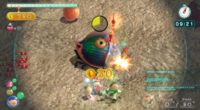Joustmite
| |||
|---|---|---|---|
| File:Joustmite.png | |||
| Appears in | Pikmin 3 | ||
| Scientific name | Unknown | ||
| Family | Unknown | ||
| Areas | Distant Tundra | ||
| Mission Mode Collect Treasure! stages | Thirsty Desert | ||
| Mission Mode Battle Enemies! stages | Distant Tundra Remix | ||
| Side Story days | None | ||
| Bingo Battle stages | None | ||
| Attacks | Stabs and eats Pikmin | ||
Joustmites (カブリムシ?, lit.: "Head Insect") are enemies that were first introduced in Pikmin 3. They behave similarly to the Cloaking Burrow-nit, and look like them as well. They can be seen as an opposite of the Burrow-nit however, as Joustmites shields the front of their body, requiring the Pikmin to attack from behind. It is unconfirmed if the two species are related or part of the same family, though it wouldn't be surprising. Flying variants, known as Flighty Joustmites, also appear in Pikmin 3.
Stats
| Weight | Max. carriers |
Seeds | Value | Health |
|---|---|---|---|---|
| 7 | 14 (normally) | 6 | 450 |
Notes
Pikmin 3 Prima Guide
“The Joustmite spends most of its time partially buried with its colorful shell protruding from the ground. When it senses nearby prey, this well-armored creature emerges and uses its retractable beak to skewer nearby victims. Rock Pikmin cannot be damaged by the Joustmite's attacks, making them a very good option when facing this enemy. When you're leading a large squad, however, any combination of Pikmin can make short work of this enemy. Approach the Joustmite from the rear and attack the creature's fleshy body until you defeat it.”
Behavior
Just like the Cloaking Burrow-nit, the Joustmite hides partially buried in the ground, waiting for unsuspecting prey. Once a group of Pikmin enters the attack range of the enemy, it pops out from under the ground and proceeds to attack the player's Pikmin by attempting to use its long, needle-like proboscis to spear them. If any Pikmin are caught in this attack, they will be held in the air for a brief moment before being eaten. Unlike the Burrow-nit, the Joustmite can capture up to 3 Pikmin with this attack.
It should be noted that Rock Pikmin are immune to its stabbing attacks. The Joustmite can also shake off Pikmin, which also shakes its loose carapace. The enemy is rather slow-moving, making it easy to walk around and attack from behind.
Strategy
|
The following article or section contains guides. |
As mentioned before, the Joustmite protects the front of its body, making it completely immune to frontal assaults. The most effective strategy is to approach it from behind without waking it up, and proceeding to swarm the creature. If the Joustmite is awake, you can still try to run behind it and proceed to throw Pikmin, or you can run away, and the Joustmite will go back underground. Rock Pikmin are immune to its attacks, making throwing them at the Joustmite's rear another effective strategy. The enemy eats Pikmin at a rather fast rate, so be aware.
Technical information
| Pikmin 3 technical information (?) | |
|---|---|
| Internal name | kaburi
|
| HP | 450 |
| Rock Pikmin throw hits to kill | 10 |
| White Pikmin ingestions to kill | 3 |
| Bomb rock explosions to kill | 1 |
| Bomb rock ingestions to kill | 0 |
| Number of direct hits on top to kill | 0 |
| Damage to leaders | 10 |
| Territory radius | 200 |
| Mission Mode value | 30 |
Gallery
- Burried.PNG
A Joustmite buried in the ground.
A Joustmite in the Distant Tundra area.
- ZlCfzREdZZgZDnG6nH.jpg
A frontal view of the Joustmite.
- Joustmite.jpg
A side view of a wandering Joustmite.
- CloakingBurrowNitDead.png
A Joustmite's carcass.
- JoustmiteDataFile.jpg
The data file on the Joustmite.
Trivia
- The Joustmites are named after jousting, a medieval sport with two opponents riding on horses, with the objective to knock the other one off of the horse using a sharp lance. The connection is made due to the Joustmite's proboscis.
- Unlike the Cloaking Burrow-nit, the Joustmite's death and shaking animations show that its shell is unattached to its body, making it more of a helmet than an actual shell.
Names in other languages
| Language | Name | Meaning |
|---|---|---|
| Cachepique | From cache (hide) and pique (pike) | |
| Gepanzerter Grabwicht | Armored Burrow midget | |
| Liendre astada | Horned nit |

